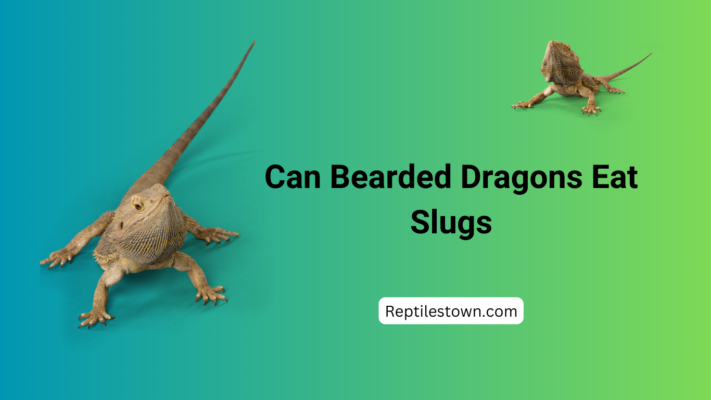Bearded dragons eat insects like dubia roaches, crickets, and mealworms. But what about slugs? Can bearded dragons eat slugs?
This blog post will cover all the information you need to know about slugs for bearded dragons.
Keep reading to learn more!
Can Bearded Dragons Eat Slugs?

Yes, bearded dragons have the potential to consume slugs. Still, avoiding making them a regular part of their diet is a good idea.
Although slugs offer a decent protein content, consuming them excessively might lead to potential health problems like kidney issues.
Why shouldn’t you feed your bearded dragon slugs?
Bearded dragons shouldn’t be fed slugs due to several reasons.
![]() Parasites and bacteria: Slugs have the potential to transport dangerous parasites and bacteria, including lungworms, tapeworms, and salmonella. These microorganisms can create health hazards for bearded dragons.
Parasites and bacteria: Slugs have the potential to transport dangerous parasites and bacteria, including lungworms, tapeworms, and salmonella. These microorganisms can create health hazards for bearded dragons.
![]() Digestive issues: The slippery consistency of slugs can pose challenges for the delicate digestive tract of bearded dragons. It might result in issues like bloating, discomfort, and potential blockages.
Digestive issues: The slippery consistency of slugs can pose challenges for the delicate digestive tract of bearded dragons. It might result in issues like bloating, discomfort, and potential blockages.
![]() Chemical contamination: Slugs from gardens or outdoor environments may come into contact with pesticides or other chemicals, making them toxic to bearded dragons.
Chemical contamination: Slugs from gardens or outdoor environments may come into contact with pesticides or other chemicals, making them toxic to bearded dragons.
![]() Nutritional balance: Slugs have a different nutrient profile compared to suitable food options like vegetables, fruits, and insects, which can lead to nutrient deficiencies if relied upon too heavily.
Nutritional balance: Slugs have a different nutrient profile compared to suitable food options like vegetables, fruits, and insects, which can lead to nutrient deficiencies if relied upon too heavily.
![]() Allergic reactions: Some bearded dragons may develop allergies or sensitivities towards slugs, so it’s important to monitor their response for signs of adverse reactions like itching, swelling, or respiratory issues.
Allergic reactions: Some bearded dragons may develop allergies or sensitivities towards slugs, so it’s important to monitor their response for signs of adverse reactions like itching, swelling, or respiratory issues.
To ensure the health and well-being of your bearded dragon, stick to a diet of recommended insects and vegetables, avoiding slugs altogether.
Also Read: Do Bearded Dragons Like Blankets?
FAQs about Can Bearded Dragons Eat Slugs?
Are slugs a safe and nutritious food option for bearded dragons?
No, slugs are not the safe food option for bearded dragons.
Can slugs cause kidney disease in bearded dragons?
Yes, there is a potential risk that slugs could contribute to kidney disease in bearded dragons. Therefore, it’s important to avoid feeding slugs to bearded dragons to minimize the risk of kidney-related health issues.
What should I do if my bearded dragon accidentally eats a slug?
If your bearded dragon accidentally eats a slug, closely monitor its behavior and health. One accidental ingestion might not lead to instant harm, but it’s important to watch for unusual signs like tiredness, upset stomach, or throwing up.
If you observe any worrying changes, seek advice from a vet with reptile care experience.
Is it necessary to dust insects with supplements?
Yes, dust insects with calcium and vitamin D3 supplements to ensure proper bone health.
Conclusion
In conclusion, while bearded dragons technically can consume slugs, it’s not advisable to include them as a regular diet. Although slugs provide a protein source, their consumption presents considerable health hazards that overshadow the potential advantages.
Slugs can harbor harmful parasites, bacteria, and toxins such as lungworms, tapeworms, and pesticides.
Related Articles:
Can Bearded Dragons Eat Silkworms?
Do Bearded Dragons Like to Cuddle?
6 Best UVB Light For Bearded Dragon 40 Gallon Tank

